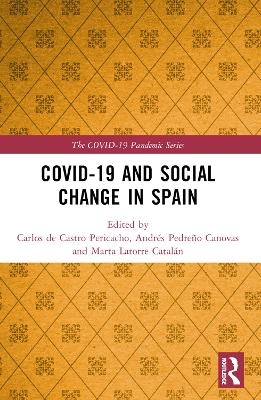
COVID-19 and Social Change in Spain
Routledge (Verlag)
978-1-032-25130-1 (ISBN)
This book originates in the great upheaval caused by the COVID-19 pandemic when the unprecedented announcement of global lockdowns paralysed the world and put social relations on hold. In response, a loose collective of sociologists, historians and philosophers from various Spanish universities began to share their reflections on the pandemic on the Sociología en Cuarantena blog. This book takes some of those thoughts and delves deeper into the recurring themes as they relate to the Spanish experience of the pandemic. The chapters in the first part of the book address the social and political context of the various measures put in place by the government to deal with the health, economic and social effects of the pandemic. Subsequently, several chapters examine how the pandemic led to important reflections on uncertainty and authority in processes of scientific knowledge production. Other chapters analyse the effects of the pandemic on demographics, the organisation of care, the education system, the organisation of work and the recognition of essential workers, immigration policies and the digitalisation of society. Collectively, the contributions call into question the narrative of exceptionalism that views the pandemic as a singular event that is uniquely responsible for the present situation of uncertainty and instability. They also draw attention to the fragility of social prestige and trust in neglected and weakened public institutions, as well as identifying a growing socio-political polarisation that may be highly significant in the future.
This collection will appeal to students and researchers with an interest in contemporary Spain and the socio-political effects of the COVID-19 pandemic.
Carlos de Castro is an Associate Professor in the Department of Sociology at the Universidad Autónoma de Madrid, Spain. Andrés Pedreño is an Associate Professor in the Department of Sociology at the University of Murcia, Spain. Marta Latorre is an Associate Professor in the Department of Sociology at the University of Murcia, Spain.
Part I 1. Introduction: The pandemic and social change 2. The pandemic, deglobalization and world society 3. The bureaucratic strength of neoliberalism 4. The sociology of the State of alarm: legitimisation and dispute during the COVID-19 in Spain 5. "Everything is going to be fine": emotion rules, the institutional framework and social mobilisation during the COVID-19 in Spain 6. Right now: history will be public, or it will not be 7. Science in action: controversies and public knowledge during the COVID19 pandemic Part II 8. A socio-demographic look at the pandemic 9. A care system in crisis: the impact of the COVID-19 pandemic on gender equality 10. The growth of precarious employment for women in the care work sector during the COVID-19 pandemic 11. Social division of labour, recognition and contempt in the health crisis 12. The impact of Covid-19 on the Spanish education system 13. Human mobility, immigration and racism in times of syndemic 14. COVIDigital: new virtual spaces and digital habits for a transformed sociability 15. Conclusions: "Fear is not the State"
| Erscheinungsdatum | 08.11.2022 |
|---|---|
| Reihe/Serie | The COVID-19 Pandemic Series |
| Zusatzinfo | 5 Tables, black and white; 11 Line drawings, black and white; 1 Halftones, black and white; 12 Illustrations, black and white |
| Verlagsort | London |
| Sprache | englisch |
| Maße | 156 x 234 mm |
| Gewicht | 453 g |
| Themenwelt | Geschichte ► Teilgebiete der Geschichte ► Kulturgeschichte |
| Geschichte ► Teilgebiete der Geschichte ► Sozialgeschichte | |
| Medizin / Pharmazie ► Gesundheitswesen | |
| Sozialwissenschaften ► Ethnologie | |
| Sozialwissenschaften ► Soziologie | |
| ISBN-10 | 1-032-25130-1 / 1032251301 |
| ISBN-13 | 978-1-032-25130-1 / 9781032251301 |
| Zustand | Neuware |
| Informationen gemäß Produktsicherheitsverordnung (GPSR) | |
| Haben Sie eine Frage zum Produkt? |
aus dem Bereich


